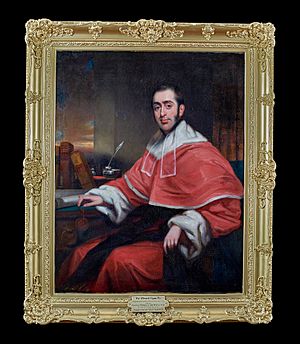Edward Ryan (barrister) facts for kids
Sir Edward Ryan (born August 28, 1793 – died August 22, 1875) was an important English lawyer and judge. He was also a reformer who helped improve the way the British government worked, especially its Civil Service. He was also a big supporter of science. From 1833 to 1843, he served as the top judge, known as the Chief Justice of Bengal, in India when it was under British rule.
Contents
Early Life and Education
Edward Ryan was born in 1793. He went to Trinity College, Cambridge, a famous university, and finished his studies there in 1814. While at Cambridge, he became good friends with some very smart people who were interested in science and math, like John Herschel, Charles Babbage (who is known as a pioneer of computers), and George Peacock.
In 1817, Ryan became a lawyer, which means he was "called to the bar" by Lincoln's Inn in London. His friend John Herschel's love for science encouraged Ryan to join the Royal Astronomical Society in 1820. This group was for people interested in stars and space.
Before he moved to India, Ryan worked as a lawyer in England. He also helped write a book about important court cases. Later, he was chosen to be a judge in the main court in Bengal, India. This was a big honor, and he was given a special title called a knighthood.
Time in India
Sir Edward Ryan arrived in India in 1827. He quickly became known for hosting gatherings where smart people would meet to discuss ideas. He was a strong supporter of science and led groups focused on farming and gardening. He also supported the Society for the Diffusion of Useful Knowledge, which aimed to spread education.
While in India, Ryan worked closely with Thomas Babington Macaulay, who was creating new laws for India. Ryan's support for Macaulay helped them become good friends. The Governor-General, Lord William Bentinck, also thought highly of Ryan. When the Chief Justice of Bengal passed away in 1833, Sir Edward Ryan was chosen to take his place.
Ryan, Macaulay, and Charles Trevelyan believed that education in India could be made better by teaching English widely. They thought this would help people in India learn from books and materials written in English. From 1835, these three men worked together on a committee for public education. When Macaulay and Trevelyan left India in 1838, Ryan became the head of this important committee.
Return to England
In January 1843, Sir Edward Ryan left his job as Chief Justice and went back to England. He planned to help the Judicial Committee of the Privy Council with appeals, which are requests to review decisions made by courts in India. Because of this important role, he was made a Privy Councillor.
After returning to England, he held several other important positions, including:
- Being a permanent member of the Judicial Committee from 1850 to 1865.
- Serving on a special committee that looked at English criminal laws in 1845.
- Working as a Railway Commissioner starting in 1846.
- Helping to manage government money as an Assistant Controller of the Exchequer from 1851 to 1862.
In 1850, Ryan's friend Charles Trevelyan worked to open up the Indian Civil Service (government jobs in India) to people who were born in India.
Reforming the Civil Service
In 1854, a report called the Northcote–Trevelyan Report said that the British Civil Service had problems. It said that jobs were often given to friends or family (this is called cronyism) instead of the most qualified people. The report suggested that people should get jobs in the government based on open tests and public exams.
Sir Edward Ryan became the very first First Civil Service Commissioner in 1855. His job was to make these important changes happen. It wasn't easy, as many people in power didn't want things to change. But Ryan was smart and careful. He slowly introduced and tested the new system of universal exams, and by 1870, it was fully in place. The commission also managed exams for people wanting to join the Indian Civil Service and the British Army.
Family Life
On December 13, 1814, Edward Ryan married Louisa Whitmore. His friend, Charles Babbage, married Louisa's sister, Georgiana, in the same year, making Ryan and Babbage brothers-in-law.
Sir Edward and Louisa Ryan had eight sons and three daughters. Some of their children also had notable careers, like Colonel Edward Moody Ryan and Colonel William Cavendish Bentinck Ryan, who both served in the Bengal army. Their son, Sir Charles Lister Ryan, later became a very important government auditor.
Sir Edward Ryan passed away on August 22, 1875, in Dover, England. He is buried in Kensal Green Cemetery in London.
Honors and Achievements
Sir Edward Ryan received many honors and held important positions throughout his life, showing his dedication to law, science, and public service:
- He became a Fellow of the Royal Astronomical Society in 1820.
- He was made a Bencher of Lincoln's Inn (a senior position for lawyers) in 1844.
- He became a Fellow of the Royal Geographical Society in 1846.
- He was a member of the senate of the University of London from 1846 to 1875, and served as its Vice-chancellor from 1871 to 1874.
- He was a member of the council for University College London.
- He joined the Council of Legal Education in 1852.
- He was made a Fellow of the Royal Society in 1860, which is a very high honor for scientists.
 | John T. Biggers |
 | Thomas Blackshear |
 | Mark Bradford |
 | Beverly Buchanan |


